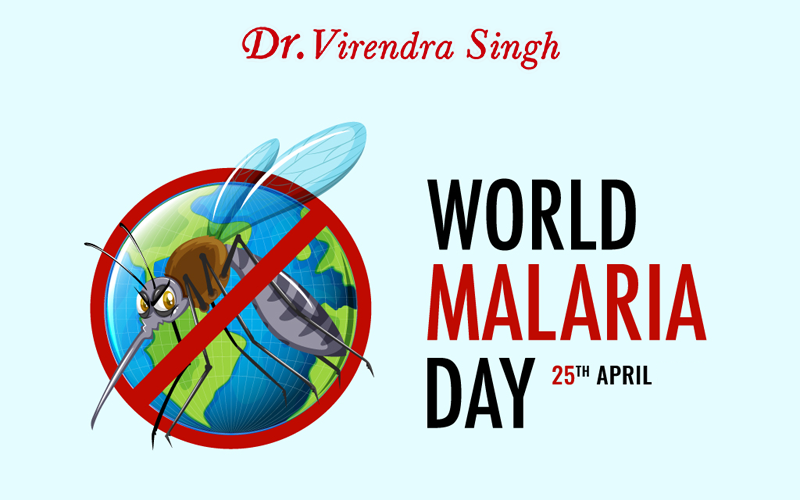
World Malaria Day is held each year on April 25th. The world comes together on World Malaria Day 2024 with a renewed resolve to fight one of humanity’s oldest and deadliest enemies. As governments all across the world consider the strides made and the obstacles still to be overcome, this year’s commemoration represents a turning point in the ongoing efforts to eradicate malaria. There have been notable advancements in the fight against malaria thanks to ground-breaking research, cutting-edge technologies, and cooperative efforts.
The day serves as a platform to raise awareness, share success stories, and advocate for continued investment in research, prevention, and treatment strategies. There is a call to action as we observe World Malaria Day in 2024, asking governments, organizations, and individuals to step up their efforts toward eradicating malaria and making sure that no one is left behind in the pursuit of a stronger, more resilient global community.
On World Malaria Day 2024, the individual guidance and expertise of Dr. Virendra Singh shine as a beacon in the global effort to combat malaria. He is a distinguished leader in the field of infectious diseases and a staunch advocate for public health, has played a pivotal role in shaping strategic initiatives aimed at eradicating Malaria. His devotion to community involvement, creative preventive strategies, and relentless pursuit of research have established him as a reliable advisor in the ongoing fight against this mosquito-borne illness. Source URL
The Theme for World Malaria Day 2024
The Theme for World Malaria Day 2024 is ‘Time to Deliver Zero Malaria: Invest, Innovate, Implement.’
Symptoms and Complication
- The Typical symptoms of Malaria include sweating, chills, fever, headache, fatigue, muscle aches, nausea, and vomiting.
- Severe Malaria can lead to complications like Kidney failure, Severe Anemia, Coma, Seizures, and even death, especially if not diagnosed and treated promptly.
Causes and Transmission
- The Plasmodium genus of parasites is responsible for the sickness. Plasmodium falciparum, the parasite that causes the deadliest form of malaria in humans, is the most common malaria parasite.
- When an Anopheles mosquito bites an infected individual and subsequently bites someone else, it acts as a vector, spreading the parasites.
- The parasites enter the human body through the liver, where they proliferate inside the red blood cells and produce a variety of symptoms.
Types of Malaria
- Four main types of Malaria infect humans: Plasmodium Vivax, Plasmodium Ovale, Plasmodium Falciparum, and Plasmodium Malariae.
- The most deadly form of P. falciparum is known to cause milder illnesses in most cases.
Prevention and Treatment
- Prevention Measures include using insect repellents, mosquito nets, and antimalarial medication for travelers to high-risk areas.
- To avoid complications and mortality, early diagnosis and treatment with potent antimalarial medications are essential.
- Additionally, researchers are developing vaccinations and other cutting-edge approaches to manage and eventually eradicate Malaria.
Global Impact
- The WHO estimates that there were 249 million cases of malaria worldwide in 2022, and the disease claimed 608,000 lives.
- Children under five years old are disproportionately affected, accounting for approximately 82% of all Malaria deaths.
- The illness has a substantial negative impact on the economics and healthcare systems of the afflicted areas.
Current Efforts and Challenges
- Global efforts are concentrated on decreasing the number of cases and deaths from malaria, expanding access to instruments for treatment and prevention, and encouraging research and development of novel treatments.
- However, challenges remain, including drug resistance, insecticide resistance, and inadequate healthcare infrastructure in some regions.
Although malaria is a disease that may be prevented and treated, major efforts are still required to achieve its eradication. By understanding the disease, and its impact, we can contribute to a world free from Malaria. Source URL→
History of World Malaria Day
The history of World Malaria Day is characterized by a path of rising commitment, increasing awareness, and notable advancements in the management and, eventually, eradication of this terrible illness. Here’s a glimpse into its evolution:
1. Early Years (2000-2007)
- Africa Malaria Day: Africa Malaria Day was first observed on April 25, 2001, by African nations as a way to draw attention to the disease’s disproportionate impact on the continent and to support regional efforts to prevent it.
- Focus on Awareness and Action: The day aims to mobilize funds for control efforts within Africa and to increase awareness about malaria prevention and treatment. Source URL…
2. Evolution to World Malaria Day (2008-Present)
- Global Recognition: The World Health Assembly approved the idea to rename Africa Malaria Day to World Malaria Day in 2007 in recognition of the disease’s global impact. This shift marked a significant step towards recognizing and tackling Malaria as a global health challenge.
- Annual Themes: Ever since World Malaria Day has embraced, yearly themes draw attention to particular facets of the anti-malaria effort.
- Increased Momentum: Over the years, World Malaria Day has evolved into a platform for global advocacy, resource mobilization, and progress evaluation. It has fostered collaboration between governments, health organizations, NGOs, researchers, and communities, leading to:
- Improved access to prevention tools like bed nets and medication.
- Increased funding for Malaria control programs.
- Considerable decline in malaria fatalities and cases, especially in Africa/
- Creation of novel diagnostic and therapeutic techniques.
FAQs
What is World Malaria Day, and why is it observed?
World Malaria Day is observed annually on April 25th to raise awareness about Malaria, its prevention, and the progress made in the fight against this disease. It offers an opportunity to mobilize global efforts to control and ultimately eliminate Malaria.
What are the key Challenges in the fight against Malaria in 2024?
In 2024, medication resistance, healthcare access in distant places, and the effect of climate change on malaria transmission will be major obstacles in the fight against malaria. Ongoing research and collaborative efforts are crucial to overcoming these challenges.
How can individuals contribute to the efforts against Malaria?
People may battle malaria by utilizing bed nets and other preventive measures, spreading awareness in their communities, funding organizations that work on the disease’s prevention and treatment, and keeping up with the most recent advancements in the field’s research.
What progress has been made in Malaria research and innovation?
The creation of fresh antimalarial medications enhanced diagnostic instruments, and the investigation of cutting-edge vector control strategies are examples of advances in malaria research and innovation. These advancements contribute to more effective prevention, diagnosis, and treatment.
How does climate change impact the spread of Malaria?
Through changes in temperature and rainfall patterns, which impact the habitats of mosquitoes carrying the malaria parasite, climate change can have an impact on the distribution and intensity of malaria transmission.
